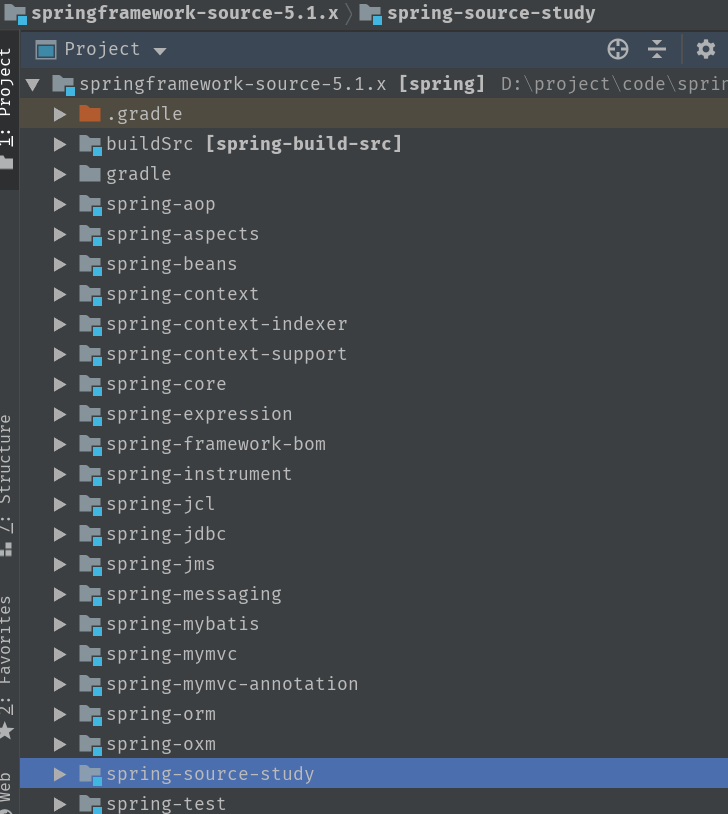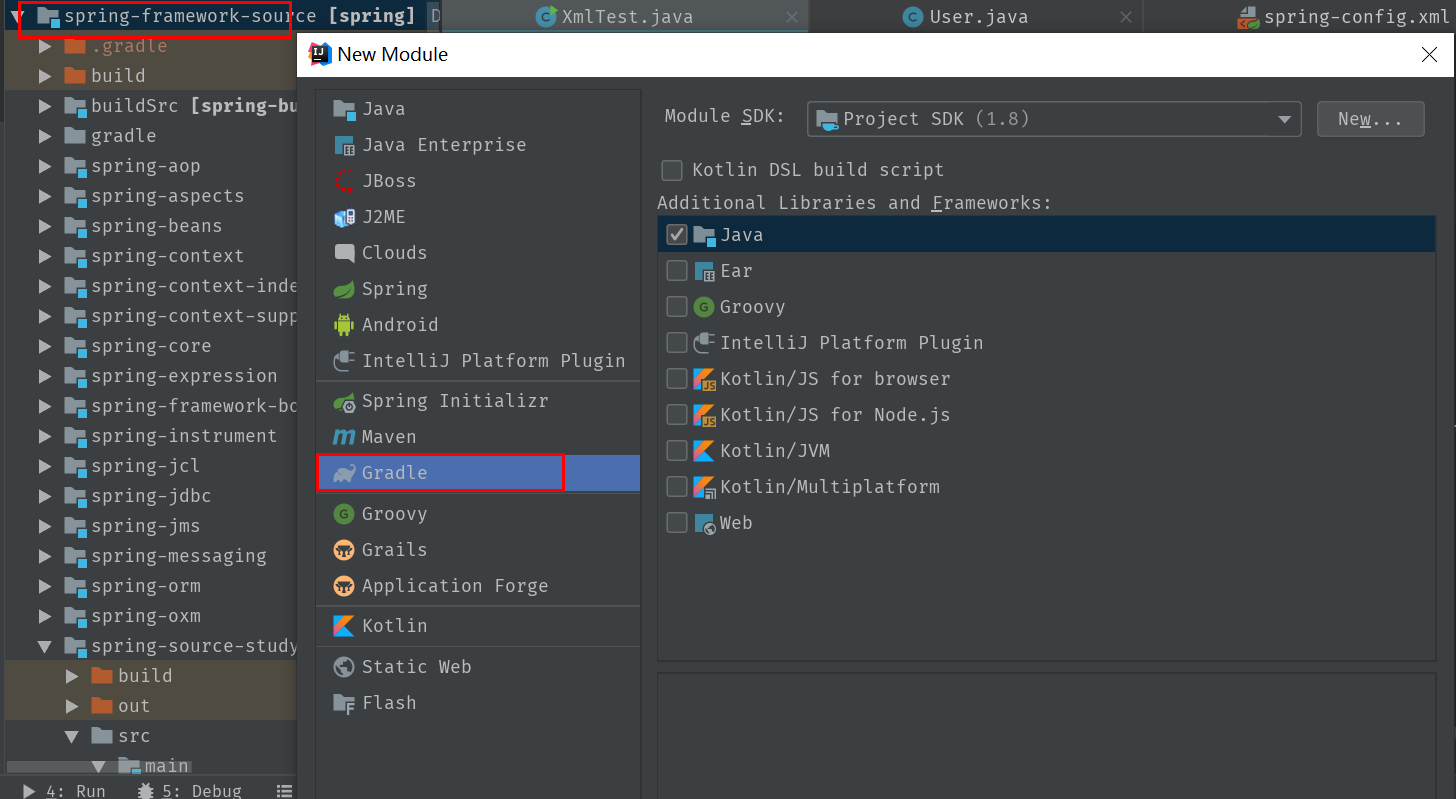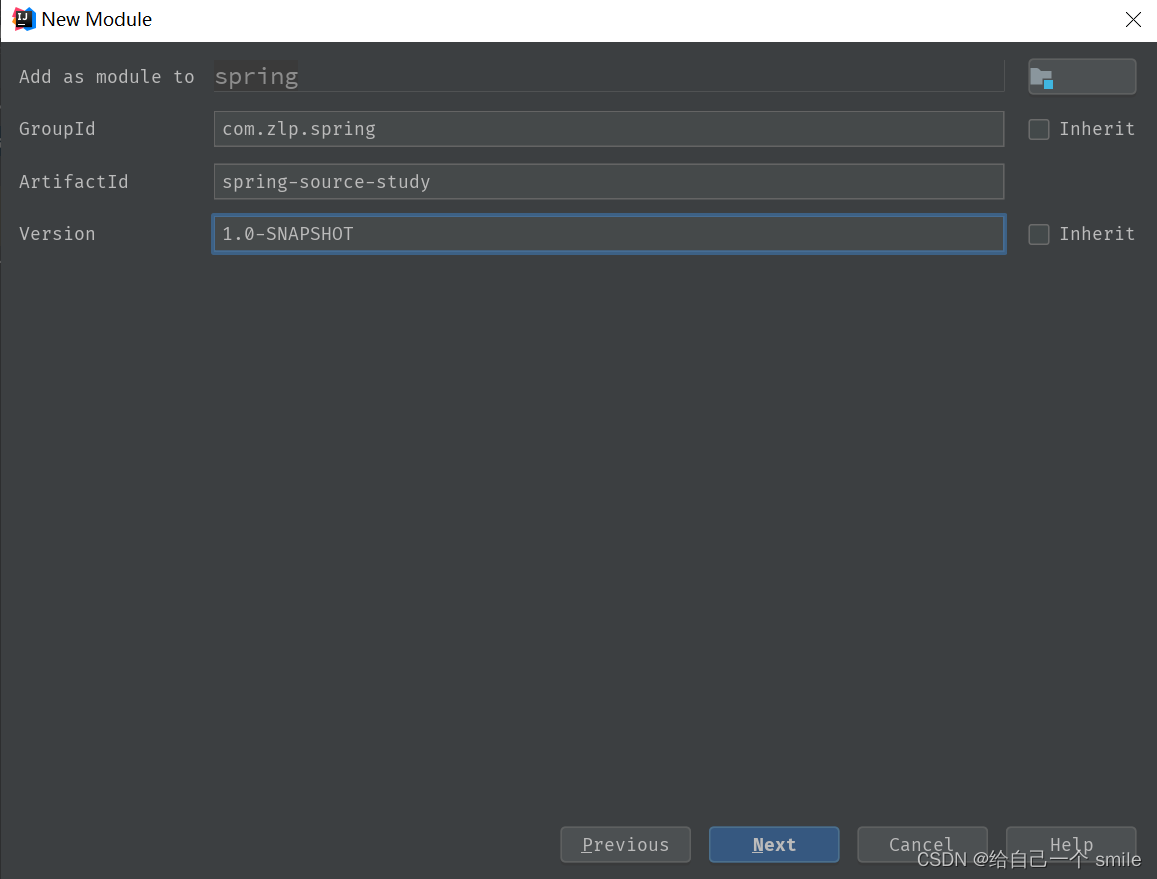- 概述
- 模块详细介绍
- spring-aop 模块
- spring-aspects 模块
- spring-beans 模块
- spring-context 模块
- spring-context-indexer 模块
- spring-context-support 模块
- spring-core 模块
- spring-expression 模块
- spring-framework-bom 模块
- spring-instrument 模块
- spring-jcl 模块
- spring-jdbc 模块
- spring-jms 模块
- spring-messaging 模块
- spring-orm 模块
- spring-oxm 模块
- spring-test 模块
- spring-tx 模块
- spring-web 模块
- spring-webflux 模块
- spring-webmvc 模块
- spring-websocket 模块
- 模块间依赖关系
- 搭建自己模块
概述
在Spring源码中,利用模块化的思想,将不同功能的代码放置到不同模块中,使用时可以按需引入,很大程度上方便了开发者的使用,但是从最初的版本到目前最新版本5.2,合并了一些模块例如:spring-instrument-tomcat。同时又扩展出来了很多模块。例如:spring-jcl,spring-context-indexer 等等。这些模块具体作用是什么呢?下面将介绍每个模块的具体作用以及开发过程中常用的组合关系。
模块详细介绍
Spring5.x 中的模块划分如下图所示,总共有 22 个模块:
spring-aop 模块
面向切面编程时使用。Spring 通过”横切“的方式将贯穿于多业务中的公共功能独立抽取出来,形成单独的切面,并指定切面的具体动作,在需要使用该功能时,动态地将该功能切入到需要的地方。
spring-aspects 模块
用来实现 AspectJ 框架的集成。而 AspectJ 是一个通过对 java 扩展出之后的框架,框架里面定义了AOP 的语法,通过特殊的编译器完成编译期间的代码织入,最后生成增强之后的 Class 文件。
spring-beans 模块
完成 Spring 框架的基本功能,里面定义了大量和 Bean 有关的接口,类及注解。例如:bean 定义的顶层接口 BeanDefinition、bean 装配相关的注解 Autowired/Qualifier/Value、用来创建 bean 的工厂接口 BeanFactory 及一些具体的工厂方法等。
spring-context 模块
用来实现 Spring 上下文功能,及 Spring 的IOC,例如初始化 Spring 容器时所使用的 ApplicationContext 接口及常用的抽象实现类 AnnotationConfigApplicatoinContext 或者 ClasspathXmlApplicationContext 等。
spring-context-indexer 模块
用来创建Spring应用启动时候选组件的索引,以提高应用的启动速度。通常情况下,应用启动的时候会去扫描类路径下的所有组件,但是如果组件特别多,会导致应用启动特别缓慢。该模块可以在应用的编译器对应用的类路径下的组件创建索引,在启动的时候通过索引去加载和初始化组件,可以大大提升应用启动的速度。
spring-context-support 模块
用来提供 Spring 上下文的一些扩展模块,例如实现邮件服务、视图解析、缓存(定义了对下面几种缓存的支持:caffeine,ehcache,jcache)、定时任务调度等。
spring-core 模块
Spring 的核心功能实现,例如:控制反转(IOC)、依赖注入(DI)、asm 以及 cglib 的实现。
spring-expression 模块
spring-framework-bom 模块
通过该模块,可以解决 Spring 中的模块与其他框架整合时产生 jar 包版本的冲突,默认为空实现。
spring-instrument 模块
实现 Spring 对服务器的代理接口功能实现,实现的是类级别或者 ClassLoader 级别的代理功能。
spring-jcl 模块
通过适配器设计模式实现的一个用来统一管理日志的框架,对外体统统一的接口,采用”适配器类“将日志的操作全部委托给具体的日志框架,提供了对多种日志框架的支持。
spring-jdbc 模块
Spring 对JDBC(Java Data Base Connector)功能的支持,里面定义了用于操作数据的多种API,常用的即:JdbcTemplate,通过模板设计模式将数据库的操作和具体业务分离,降低了数据库操作和业务功能的耦合。
spring-jms 模块
对 Java 消息服务的支持,对 JDK 中的 JMS API 进行了简单的封装。
spring-messaging 模块
spring-orm 模块
提供了一些整合第三方 ORM 框架的抽象接口,用来支持与第三方 ORM 框架进行整合,例如:MyBatis,Hibernate,Spring JPA 等。
spring-oxm 模块
Spring 用来对对象和 xml(Object/xml)映射的支持,完成 xml 和 object 对象的相互转换。
spring-test 模块
Spring 对 Junit 测试框架的简单封装,用来快速构建应用的单元测试功能及 Mock 测试。
spring-tx 模块
Spring 对一些数据访问框架提供的声明式事务或者编程式事务(通过配置文件进行事务的声明)的支持。例如:Hibernate,MyBatis,JPA 等。
spring-web 模块
用来支持 Web 系统的功能。例如:文件上传,与JSF的集成,过滤器 Filter 的支持等。
spring-webflux 模块
Spring5 中新增的一个通过响应式编程来实现 web 功能的框架。内部支持了reactive 和非阻塞式的功能,例如可以通过tcp的长连接来实现数据传输。webmvc 的升级版,webmvc 是基于 servlet的,而 webflux 是基于 reactive 的。
spring-webmvc 模块
用来支持 SpringMVC 的功能,包括了和 SpringMVC 框架相关的所有类或者接口,例如常用的DispatcherServlet、ModelAndView、HandlerAdaptor 等。另外提供了支持国际化、标签、主题、FreeMarker、Velocity、XSLT 的相关类。注意:如果使用了其他类似于 smart-framework 的独立MVC框架,则不需要使用该模块中的任何类。
spring-websocket 模块
Spring 对 websocket 的简单封装,提供了及时通信的功能,常用于一些即时通讯功能的开发,例如:聊天室。
模块间依赖关系
下面介绍在使用某一个模块的功能,这个模块所依赖的其他模块,后面在分析 Spring 源码的过程中会有大用。
SpringCore 模块
spring-context:-spring-core-spring-beans-spring-aop-spring-expression-spring-instrument[optional]
SpringAOP 模块
spring-aop:-spring-core-spring-beans-aspectjweaver[optional]
SpringJDBC 模块
spring-jdbc:-spring-core-spring-beans-spring-tx-spring-context[optional]spring-tx:-spring-core-spring-beans-spring-aop[optional]-spring-context[optional]spring-orm:-spring-core-spring-beans-spring-jdbc-spring-tx-spring-aop[optional]-spring-context[optional]-spring-web[optional]spring-oxm:-spring-core-spring-beansspring-jms:-spring-core-spring-beans-spring-messaging-spring-tx-spring-aop[optional]-spring-context[optional]-spring-oxm[optional]
SpringWeb 模块
spring-web:-spring-core-spring-beans-spring-aop[optional]-spring-context[optional]-spring-oxm[optional]spring-webmvc:-spring-core-spring-beans-spring-web-spring-expression-spring-context-spring-aop-spring-context-support[optional]-spring-oxm[optional]spring-websocket:-spring-core-spring-web-spring-context-spring-webmvc[optional]-spring-messaging[optional]spring-messaging:-spring-core-spring-beans-spring-context[optional]-spring-oxm[optional]
搭建自己模块
导入成功之后可以在 project 下创建一个自己的测试 module
添加项目
项目目录右键 -> new -> module -> gradle

添加依赖
在新项目的 build.gradle 下添加对 spring 模块的依赖,这里我先添加了spring-beans 和spring-context 的依赖。
// add dependenciesdependencies {compile(project(":spring-beans"))compile(project(":spring-context"))testCompile group: 'junit', name: 'junit', version: '4.12'}
spring-config.xml 配置
<?xml version="1.0" encoding="UTF-8"?><beans xmlns="http://www.springframework.org/schema/beans"xmlns:xsi="http://www.w3.org/2001/XMLSchema-instance"xsi:schemaLocation="http://www.springframework.org/schema/beans http://www.springframework.org/schema/beans/spring-beans.xsd"><bean id="user" class="com.zlp.spring.entity.User"/></beans>
User 实体类
public class User {private String name = "ZouLiPing";public User() {}public User(String name) {this.name = name;}public String getName() {return name;}public void setName(String name) {this.name = name;}@Overridepublic String toString() {return "User{" +"name='" + name + '\'' +'}';}}
XmlTest 启动类
/*** xml 配置测试类* @date: 2022/1/11 17:57*/public class XmlTest {public static void main(String[] args) {ApplicationContext ac = new ClassPathXmlApplicationContext("spring-config.xml");User user = ac.getBean("user", User.class);System.out.println(user.toString());}}
控制输出结果
Spring 最新版本中的所有模块的具体作用以及常用模块之间的依赖关系介绍完毕!欢迎转发~

